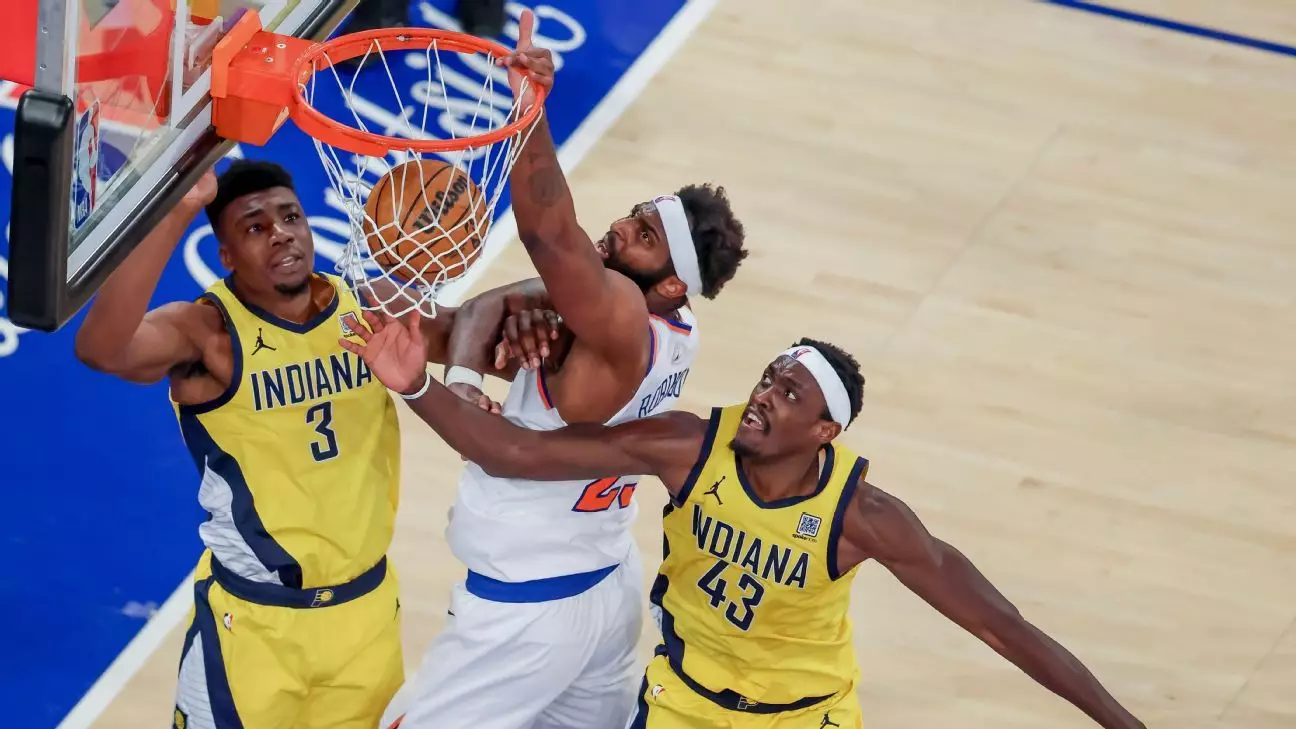In a disappointing postseason clash against the New York Knicks, the Indiana Pacers faced their most challenging offensive test yet, culminating in a 111-94 defeat that raised eyebrows and questions alike. Despite the harshness of the loss, star guard Tyrese Haliburton’s words echoed resilience, declaring there was “no need to panic.” This attitude is more than mere bravado; it speaks to the fundamental tenet of sports: the ability to regroup, learn, and emerge stronger.
While the Pacers maintain a 3-2 lead in the playoff series and look ahead to Game 6 in Indianapolis, the performance in Game 5 laid bare significant shortcomings. Indiana’s starting five, typically their backbone, managed a paltry 37 points, contributing to an alarming offensive breakdown. Their turnover count swelled to 20—a staggering number that showcases a lack of discipline and focus that has not been a hallmark of their otherwise successful playoff run. The season’s stakes are undeniable; yet, the Pacers fell victim to their own mistakes.
Understanding the Stakes and the Environment
Head coach Rick Carlisle’s introspection after the game painted a vivid picture of the team’s disarray. He highlighted the abysmal start as a critical factor leading to their failure to take control of the game. In the high-pressure environment of the playoffs, mental fortitude is as essential as skill. The Knights seized this moment, setting the tempo from the opening tip-off, while Indiana seemed lethargic, unable to match the urgency and intensity demanded at this stage.
Bennedict Mathurin’s commendable showing off the bench, scoring a team-high 23 points, is overshadowed by the dismal outputs of the starting unit. The fluid motion and offensive rhythm the Pacers had exhibited in earlier victories were conspicuously absent. Haliburton’s unusually low output of eight points, combined with a mere seven shot attempts, underscores a deeper issue: the struggle to regain or sustain momentum after a crushing defeat. The statistics reveal more than just numbers; they encapsulate a mindset that, when eroded, requires time and effort to rebuild.
The Importance of Accountability
In the aftermath of such a loss, accountability takes center stage—a principle that Haliburton embraced when he stated, “I got to be better, and I’ll be better in Game 6.” This sense of personal responsibility is paramount, as it not only sets the tone for individual growth but also reinforces a collective effort to elevate the team’s performance. The acknowledgment that the team’s pace and execution suffered suggests an earnest commitment to improvement, emphasizing the need for correction without dwelling on the past.
Moreover, the players recognize the intense physicality and play style the Knicks adopted, which exhibited a sense of dominance that the Pacers will need to counteract moving forward. Forward Aaron Nesmith’s frank assessment of the defeat reflects a crucial mindset shift—understanding when and how to learn from tough experiences is integral to success, especially in the playoffs where every game is magnified.
Looking Ahead: A Chance for Redemption
As the Pacers prepare for Game 6, there is an uplifting prospect of returning home, a scenario that often favorably influences a team’s dynamics. The opportunity to bounce back in their own arena fosters a sense of confidence and security. Pascal Siakam’s perspective allows for a nuanced understanding of the ebbs and flows of a long season; setbacks can be pivotal moments during a championship run, sparking necessary adjustments and reinvigorated techniques.
The phrase “us against the world” encapsulates the Pacers’ mentality, reminding both players and fans that the support of the home crowd can make all the difference in regaining lost momentum. Facing adversity, especially when buoyed by a winning spirit, can cultivate a more determined and cohesive unit on the court.
In the demanding landscape of the NBA, resilience, accountability, and localized support will prove critical for the Pacers to seize their next opportunity. This isn’t merely about bouncing back; it’s about evolving through hardship, ensuring the team emerges not just as competitors, but as the contenders they aspire to be each playoff season.

